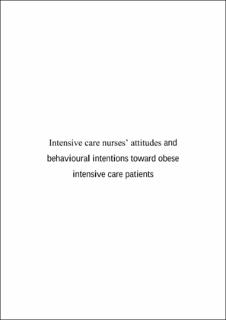| dc.contributor.author | Robstad, Anja Nastasja | |
| dc.date.accessioned | 2020-05-20T11:50:27Z | |
| dc.date.available | 2020-05-20T11:50:27Z | |
| dc.date.created | 2020-01-30T09:05:26Z | |
| dc.date.issued | 2020 | |
| dc.identifier.citation | Robstad, A. N. (2020). Intensive care nurses' attitudes and behavioural intentions toward obese intensive care patients (Doctoral thesis). University of Agder, Kristiansand. | en_US |
| dc.identifier.isbn | 978-82-7117-959-5 | |
| dc.identifier.issn | 1504-9272 | |
| dc.identifier.uri | https://hdl.handle.net/11250/2655168 | |
| dc.description | Paper I, II, and III are not available as a part of the dissertation due to the copyright. | en_US |
| dc.description.abstract | Background: Admission of obese patients with complex health care needs to intensive care units is increasing. Caring for obese critically ill patients can be challenging for qualified intensive care nurses because of the patients’ weight, critical situation and physical challenges. Previous studies have demonstrated that some healthcare professionals hold negative attitudes toward obese patients. Obese intensive care patients may experience more stress than normal weight patients; therefore, intensive care nurses’ attitudes and the way the nurses address patient care may be important. Despite a range of studies revealing that healthcare professionals hold anti-fat attitudes toward obese patients, little is known about qualified intensive care nurses’ implicit and explicit attitudes toward obese intensive care patients and if such attitudes are associated with behavioural intentions. Furthermore, there is a current gap in knowledge about qualified intensive care nurses’ experiences of caring for obese patients in intensive care units.
Aims: The overarching aim of this thesis was to understand ICU nurses’ experiences in caring for obese ICU patients, to examine the nurses’ implicit and explicit attitudes toward this group of patients and to investigate if ICU nurses’ attitudes are associated with their behavioural intentions.
Designs, methods and samples: The overall design of the thesis was a ‘sequential qualitative → quantitative’ (QUAL→ quan) multimethod design.
Main results: Qualified intensive care nurses experienced it as emotionally demanding caring for obese patients owing to their vulnerability, dissimilarity and physical challenges compared to normal weight patients. Simultaneously, they had implicit preferences for thin over thick people, and believed thick people were lazier, and having less willpower and being worse than thin people. The nurses endeavoured to provide good and equal care to all patients and to help the obese patients immediately. Behavioural intentions were not associated with any attitudes or stereotypes. The instruments were reliable, valid and suitable tools to measure qualified intensive care nurses’ attitudes and behavioural intention.
Conclusions: This study provides new information about anti-fat attitudes and behavioural intentions among qualified intensive care nurses toward vulnerable obese intensive care patients. Despite that ICU nurses are specially trained, it appears that these nurses share the same attitudes toward obese persons as other healthcare professionals and the society in general. However, their attitudes were not associated with their behavioural intentions. These results should be acknowledged by policy makers, clinical practitioners and educators to secure optimal care for obese intensive care patients. | en_US |
| dc.language.iso | eng | en_US |
| dc.publisher | 07 Media | en_US |
| dc.relation.ispartofseries | Doctoral Dissertations at the University of Agder; no. 259 | |
| dc.relation.haspart | Paper I: Robstad, N., Söderhamn, U. & Fegran, L. (2018). Intensive care nurses’ experiences of caring for obese intensive care patients: A hermeneutic study. Journal of Clinical Nursing, 27 (1-2), 386-395. doi: https://doi.org/10.1111/jocn.13937. Published version. Full-text is not available in AURA as a separate file. | en_US |
| dc.relation.haspart | Paper II: Robstad, N., Siebler, F., Söderhamn, U., Westergren, T. & Fegran, L. (2018). Design and psychometric testing of instruments to measure qualified intensive care nurses’ attitudes towards obese intensive care patients. Research in Nursing and Health, 41(6), 525-534. doi: https://doi.org/10.1002/nur.21914. Published version. Full-text is not available in AURA as a separate file. | en_US |
| dc.relation.haspart | Robstad, N., Westergren, T., Siebler, F., Söderhamn, U. & Fegran, L. (2019). Intensive care nurses’ implicit and explicit attitudes and their behavioural intentions toward obese intensive care patients. Journal of Advanced Nursing. doi: https://doi.org/10.1111/jan.14205. Published version. Full-text is not available in AURA as a separate file. | en_US |
| dc.title | Intensive care nurses' attitudes and behavioural intentions toward obese intensive care patients | en_US |
| dc.type | Doctoral thesis | en_US |
| dc.description.version | publishedVersion | en_US |
| dc.rights.holder | © 2020 Nastasja Robstad | en_US |
| dc.subject.nsi | VDP::Medisinske Fag: 700::Helsefag: 800::Sykepleievitenskap: 808 | en_US |
| dc.source.pagenumber | 278 | en_US |
| dc.source.issue | 259 | en_US |
| dc.identifier.cristin | 1785851 | |
